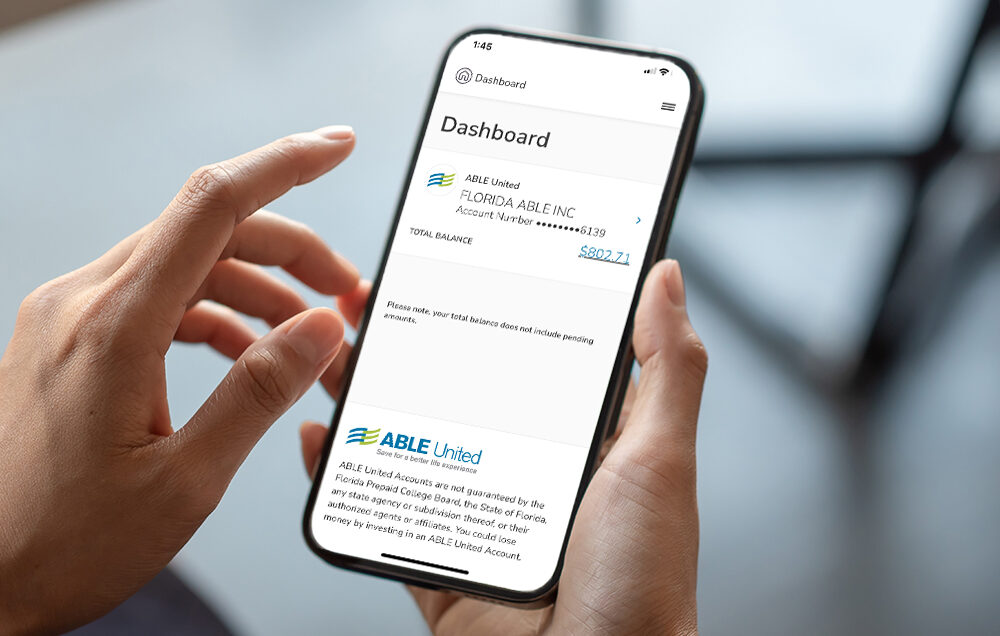Can there be more than one Authorized Legal Representative (ALR) on an ABLE United account?
There can only be one ALR per account, but you may change an ALR by submitting a request. You may request a Change of Authorized Legal Representative Form by contacting customer service Monday – Friday, 9am – 5pm ET at 1-888-524-2253, or Florida Relay Service dial 711.
Can I still work and have an ABLE United account?
Yes. Contributions into an ABLE United account from wages still count as earned income, but do not count as an asset for federally means-tested programs such as Medicaid. For SSI, the first $100,000 does not count as an asset.
Beneficiaries who work can contribute more than $19,000 per year. To learn more visit ABLE to Work.
Who is an Authorized Legal Representative (ALR)?
An Authorized Legal Representative (“ALR”) is someone who is legally authorized to make decisions for the Beneficiary as it relates to their ABLE account. An ALR is a Custodian for the Beneficiary, such as an individual selected by the Beneficiary, or the eligible individual’s agent under a power of attorney, conservator or legal guardian, the spouse, a parent, a sibling, a grandparent, or a representative payee (whether an individual or organization) appointed by the Social Security Administration (SSA), in that order. The ALR may neither have, nor acquire, any beneficial interest in the account during the Beneficiary’s lifetime and must administer the account for the benefit of the Beneficiary.
If you are interested in a power of attorney for a Beneficiary, you can find one specific to ABLE United here.
What do I need to open an account?
If you’re the Beneficiary of the account, make sure you have this information handy:
- Your email
- Your date of birth
- Social Security Number or Tax Identification Number
- Contact details
- Proof of eligibility
If you’re an Authorized Legal Representative, you’ll need your information (email, date of birth, Social Security Number or Tax Identification Number, contact details and work status). You’ll also need to know the Beneficiary’s eligibility information.
If the Beneficiary is not eligible for SSI or SSDI benefits, they need a signed Diagnosis Form from a licensed physician. You won’t need to provide it for registration, but the IRS or the Program may ask for it at any time.
Are there age restrictions to open an ABLE United account?
As long as the disability or blindness developed before the age of 26, there are no age restrictions. There are newborns who have an account, as well as individuals in their 80s.
If a Beneficiary is under the age of 18, they must have an Authorized Legal Representative (“ALR”) do it for them. An ALR is a Custodian for the Beneficiary, such as an individual selected by the Beneficiary, or the eligible individual’s agent under a power of attorney, conservator or legal guardian, the spouse, a parent, a sibling, a grandparent, or a representative payee (whether an individual or organization) appointed by the Social Security Administration (SSA), in that order. Learn more about the role of an ALR.
What are the fees?
There is no account maintenance fee. It is free to request a withdrawal via ACH or a check. If you choose to opt out of electronic statements, there is a $10 per year fee for paper statements.
There is a small investment fee that ranges between 0 and 29 bps (from $0 to $2.90 per year per $1,000 in the account). Additional fees may be assessed based on how you use the account.
If you choose to sign up for a prepaid card, there will be a $2.50 per month fee. Additional prepaid card fees may be assessed based on how you use your prepaid card.
Please see the Program Description & Participation Agreement for more information about fees.
What kind of benefits do I get by opening an ABLE United account?
One of the main benefits of having an ABLE United account is being able to save for Qualified Disability Expenses and invest for the future in a tax-advantaged account. Earnings on the account grow tax free as long as the funds are used for Qualified Disability Expenses.
Generally, funds in (or withdrawn from) an account are disregarded when determining Supplemental Security Income (SSI), Medicaid eligibility and other resource means-tested public benefit programs (SNAP, TANF, HUD Assistance, Section 8, etc.). For more information on having an account and public benefits, click here.
Other benefits include the option to have a prepaid card to use for qualified expenses, and the ability to have family and friends contribute to your account.
Does having an ABLE United account affect my other benefits?
No. You can keep your federal and state benefits (SSI, SSDI, Medicaid, SNAP, TANF, HUD Assistance, Section 8, etc.) with an account. If you receive SSI, there is a $100,000 limit before funds start counting against your $2,000 asset limit. As long as the money withdrawn is used for eligible expenses, it won’t count toward the limit.
Housing expenses are not a countable resource for SSI if they are paid directly from the account to a third party or withdrawn and paid in the same month. Withdrawals retained for Qualified Disability Expenses, other than housing, are not a countable resource for SSI. These funds must remain unspent and identifiable and are excluded in the months leading up to the actual expenditure.
How can I use the money in my ABLE United account?
You can withdraw money from your account for any reason. If it’s used for Qualified Disability Expenses, there is no tax on the earnings portion of the withdrawal. See the list of approved categories of Qualified Disability Expenses for more details.
You can also sign up for an ABLE prepaid card, load money from an ABLE United account and use it online or in stores all over the U.S.
What is a Qualified Disability Expense?
If the money in an ABLE United account is spent on one of the following Qualified Disability Expenses, as defined by federal law, the earnings on the money withdrawn are tax-free. Some of these expenses include: health, education, housing, transportation, legal fees, financial management, employment training and support, assistive technology and personal support services, oversight and monitoring, funeral and burial, and other expenses approved by Treasury regulations.
Qualified Disability Expenses include basic living expenses and are not limited to items for which there is a medical necessity or which solely benefit the Beneficiary.
As long as the expense relates to the Beneficiary and helps maintain or improve their health, independence, or quality of life, it can be considered a Qualified Disability Expense. Please read the Program Description & Participation Agreement for more information on Qualified Disability Expenses.
If asked by the IRS or Social Security Administration, for those receiving SSI, the Beneficiary or Authorized Legal Representative is responsible for providing receipts for Qualified Disability Expenses.
Featured Content


